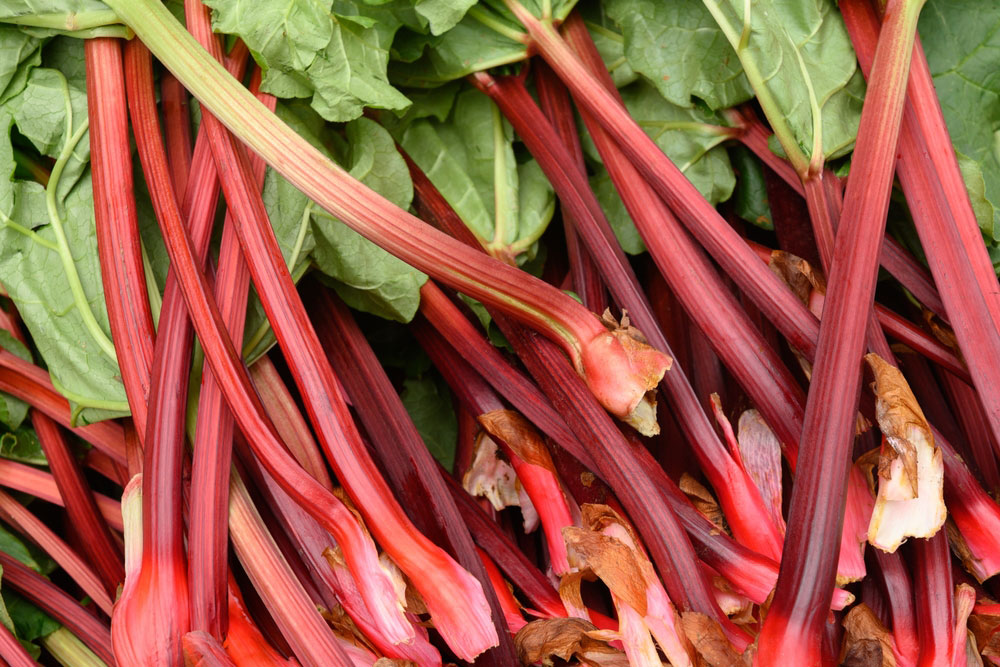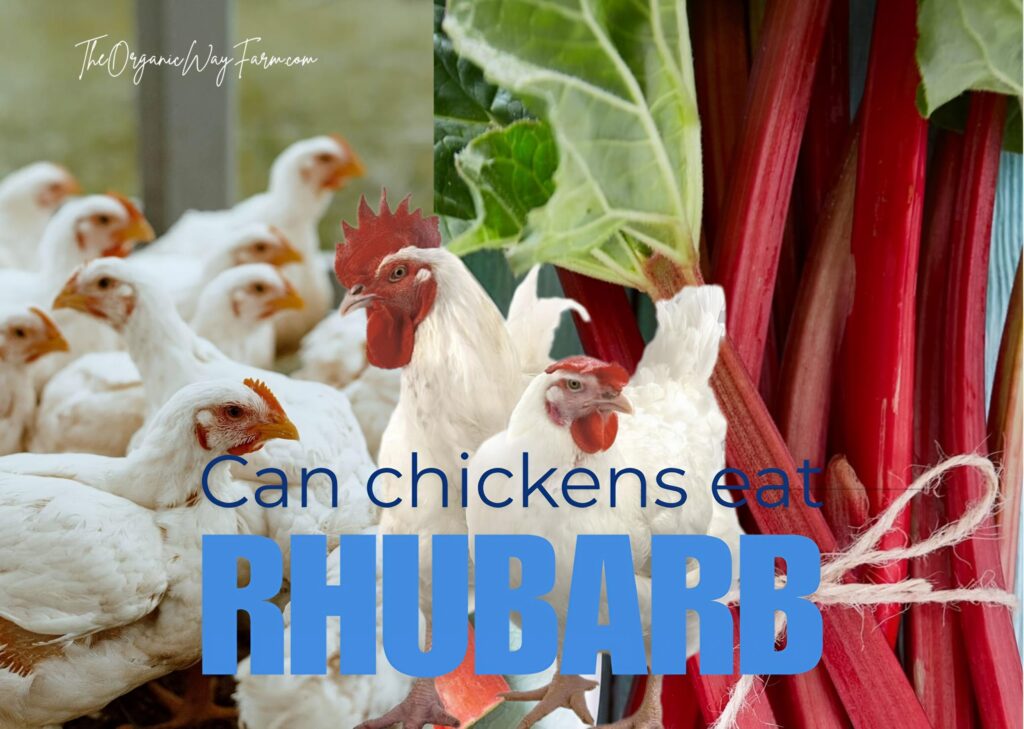If you have chickens, you might be curious about what kinds of fruits and vegetables they can eat. One popular question I get is, “Can chickens eat rhubarb?” You are definitely not alone in wondering this!
The answer is a bit tricky. While chickens can technically eat rhubarb, it is important to know that rhubarb contains oxalic acid, which can be harmful to chickens if they consume too much of it. So, the answer is YES but with some important precautions to consider.
We understand how important it is to know what to feed our chickens. That’s why we’ve taken the time to research this topic to provide you with all the needed information. Let’s explore more together, so we can keep our feathered friends safe and healthy.
- Can Chickens Eat Rhubarb?
- How Much Rhubarb Can Chickens Eat?
- Best Way to Feed Rhubarb to Chickens
- Benefits of Feeding Rhubarb to Chickens
- Risks and Dangers of Feeding Rhubarb to Chickens
- Substitutes for Rhubarb in Chicken Feed
- Frequently Asked Questions
- Final Thoughts
Can Chickens Eat Rhubarb?

Chickens are omnivores, which means they enjoy a mix of grains, seeds, fruits, and vegetables. Rhubarb is a vegetable that is often used in pies and jams due to its tart flavor. It is important to highlight that not all fruits and vegetables are safe for our chickens to eat. So, can they eat rhubarb? Let’s discuss this further.
Rhubarb stalks are the edible part of the plant, and they do contain some nutrients that could benefit chickens. For example, these stalks are high in fiber, which is good for digestion. However, we need to be cautious because rhubarb leaves are toxic to chickens (and humans too). The leaves contain high levels of oxalic acid, which can lead to serious health issues.
If we choose to offer our chickens rhubarb, it should be in small amounts and only the stalks should be given. Feeding our chickens rhubarb stalks occasionally and in moderation can add variety to their diet while ensuring they get some of the nutrients they need.
How Much Rhubarb Can Chickens Eat?
When considering how much rhubarb we can share with our chickens, moderation is key. Even though rhubarb stalks are considered safe for chickens, we should not make it a large part of their diet due to its oxalic acid content. A good rule of thumb is to limit the amount of rhubarb to no more than a few tablespoons for a group of chickens at a time. This amount should be treated as an occasional snack rather than a regular meal ingredient.
Regular chicken diets should consist mainly of grains, seeds, vegetables, and commercial feeds that provide necessary nutrients. So, if we decide to add rhubarb to their diet, it should be just a small treat. This avoids any adverse health problems associated with the consumption of too much oxalic acid, which can lead to issues like kidney stones or respiratory distress in chickens.
It’s also important to pay attention to how our chickens respond to new foods. If we do decide to introduce rhubarb, we should keep an eye on their behavior and health after they have consumed it. If we notice any unusual symptoms or reactions, we should contact a vet immediately.
Best Way to Feed Rhubarb to Chickens
Feeding rhubarb to chickens can be done in a variety of methods, but simplicity is usually best. We can offer rhubarb stalks whole or chopped into smaller pieces. The smaller pieces are especially helpful if we have younger chickens or if they are not used to consuming fresh vegetables.
An important tip is to thoroughly wash the rhubarb to remove any pesticides or dirt before offering it to our chickens. This ensures that we give them only clean and safe food. Another great option is to mix the chopped rhubarb with their regular feed. This helps disguise the tartness of the rhubarb and makes it more enticing for our feathery friends.
We should also remember to serve rhubarb in moderation. A good idea is to offer rhubarb as a treat on hot days, as chickens can benefit from the hydration it provides. Always monitor how much each chicken is eating, so none consume an excessive amount. Offering rhubarb only a few times a month is an excellent way to incorporate it without overdoing it.
Benefits of Feeding Rhubarb to Chickens
Hydration
One of the primary benefits of feeding rhubarb to our chickens is its high water content. Chickens can get dehydrated, especially during the hot months, and providing fruits and veggies like rhubarb can help keep them hydrated. Staying hydrated is essential for their overall health and egg production.
Fiber
Rhubarb is also an excellent source of fiber. Fiber aids digestion and helps prevent issues like constipation, which can be a concern for our chickens if their diet lacks proper roughage. A little rhubarb can add beneficial fiber to their meals.
Vitamins and minerals
Rhubarb contains vitamins C and K among others, which can benefit chickens in multiple ways. Vitamin C is known to help with immune function, while vitamin K is essential for blood clotting. A healthy immune system helps our chickens fend off diseases and remain vigorous.
Mental stimulation
Offering new and different foods can provide mental stimulation for our chickens. Chickens are curious creatures, and they enjoy pecking at various food items in their environment. By giving them rhubarb, we engage their natural foraging instincts, keeping them happy and entertained.
Nutritional breakdown of rhubarb
Rhubarb is a nutritious vegetable that can offer our chickens essential dietary components when incorporated correctly. A typical serving contains a variety of vitamins and minerals along with that much-needed fiber. This variety is vital in ensuring our chickens receive a balanced diet, promoting their overall health and well-being.
Risks and Dangers of Feeding Rhubarb to Chickens
While we have discussed the benefits of feeding rhubarb, it is crucial to also highlight the risks associated with it. The main concern with rhubarb is its oxalic acid content. This compound can cause serious health problems if consumed in large amounts. Symptoms of oxalic acid poisoning can include difficulty breathing, unease, and even lethargy in chickens.
On top of the oxalic acid risks, we must remember that rhubarb leaves are highly toxic. We should take precautions to remove any leaves before feeding our chickens the stalks, as even small amounts can cause severe illness or death. With any new food, the best approach is to start slow and pay attention to how our chickens react.
If we notice any signs of distress or if a chicken seems unwell after consuming rhubarb, it is essential to reach out to our vet for guidance. Knowing the signs of toxicity and being vigilant can assist in keeping our flock safe.
Substitutes for Rhubarb in Chicken Feed
If we are hesitant to feed our chickens rhubarb or if we prefer to avoid the risks altogether, there are several excellent substitutes we can consider. Many fruits and vegetables are safe and nutritious for our chickens, including leafy greens like spinach and kale, which are loaded with vitamins.
Other options include providing occasional treats such as berries, apples, and carrots. Each of these foods contributes vitamins and minerals that benefit our chickens in a similar manner to rhubarb, without the associated risks. Offering a variety of safe foods is important to ensure our chickens remain balanced and healthy.
Should we look for alternative treats, we can explore options like cucumber slices or pumpkin chunks. These choices can provide both hydration and essential nutrients, keeping our chickens happy and healthy while also satisfying their curiosity when it comes to food.
Frequently Asked Questions
1. Is it safe to feed rhubarb to chickens every day?
It is not recommended to feed rhubarb every day. Offering rhubarb as an occasional treat, a few times a month, is safer.
2. What are the symptoms of oxalic acid poisoning in chickens?
Symptoms can include difficulty breathing, lethargy, or unusual behavior. If you suspect poisoning, consult a vet immediately.
3. Can baby chicks eat rhubarb?
It is best to avoid feeding rhubarb to baby chicks. Stick to safer options for younger chicks.
4. Are there benefits to giving chickens fruits and veggies?
Yes, fruits and veggies provide hydration, fiber, and essential nutrients, aiding in overall health.
5. What other foods are safe for chickens?
Safe food options include leafy greens, berries, apples, and other fruits that do not contain harmful substances.
Final Thoughts
In conclusion, while chickens can eat rhubarb, caution is necessary. We should always ensure that only the stalks are given in moderate amounts. Keeping an eye on what our chickens eat will help ensure their health and happiness. By choosing safe alternatives and adding variety to their diet, we can provide an exciting and nutritious lifestyle for our feathery friends. Our chickens deserve the best, and choosing healthy treats means we contribute to their overall well-being. If you want to learn more about other fruits like grapes, visit can chickens eat grapes for further insights!






